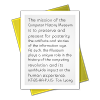Title
Cox, Brad oral historyCatalog Number
102717175Type
DocumentDescription
The lead creator of the Objective-C programming language, Dr. Brad Cox grew up on a farm in the South, but found himself more interested in science than religion. Graduating from the University of Chicago with a Ph.D. in Mathematical Biology, Cox worked on an early form of neural networks.He soon found himself more interested in computers, and got a job at International Telephone and Telegraph (ITT), where he worked with Tom Love researching the use of object-oriented programming to improve programmer productivity. At ITT, Cox became familiar with Unix and C and was introduced to Smalltalk through Byte magazine's 1981 special issue. It was at ITT that Cox began to graft Smalltalk-style object-orientation onto the C language, developing the Object-Oriented Pre-Compiler. Love and Cox would continue their partnership after leaving ITT, first joining Schlumbeger-Doll Research Labs, and then forming their own Connecticut startup, Productivity Products International (PPI), later renamed Stepstone, to further develop the OOPC into a full-blown compiled language, Objective-C.
Cox's idea behind Objective-C, articulated in articles such as "Planning the Software Industrial Revolution" (1990) and "There is a Silver Bullet" (1990), was that libraries of objects constituted pre-fabricated, reusable components that programmers could buy off the shelf on the open market, greatly accelerating development time. The Objective-C language itself was only a lightweight "soldering iron" to be used to connect components. Cox believed reusable components would industrialize the software industry in the same way that interchangeable parts revolutionized manufacturing in the 18th Century. Stepstone hoped to sell such libraries of objects, which Cox called "ICPaks," metaphorically viewing objects as integrated circuits.
While Cox focused on building his ICPak libraries, he hired a team to continue work on Objective-C, including Steve Naroff. Steve Jobs' NeXT licensed the Objective-C language for its new operating system, NEXTSTEP, and Naroff implemented many features NeXT requested, eventually joining NeXT. Stepstone had difficulty finding a market for its ICPaks, especially as the free software movement picked up, and ultimately the company folded, transferring ownership of Objective-C to NeXT.
After Stepstone folded, Cox published a subsequent book, Superdistribution. Realizing that the problem with a software components market is that scarcity does not exist, in his new book Cox proposed that instead of selling components outright, their usage should be metered.
Cox subsequently joined George Mason University's Program on Social and Organizational Learning, developing early online courses over the Internet. After leaving academia, and trying his hand at another startup, Cox shifted into government consulting, where he has continued to push for standards to reduce complexity through code reuse, but at a much coarser level of granularity than objects. Cox still believes that software developers must stop building houses with "mud" and must start using standardized, trusted "bricks." Today Cox has returned to his neural net roots and works in applying machine learning and data science to cybersecurity.
Date
2016-08-02Contributor
| Cox, Brad, Interviewee |
| Hsu, Hansen, Interviewer |
Publisher
Computer History MuseumPlace of Publication
Manassas, VAExtent
89 p.Format
PDFCategory
TranscriptionSubject
Object-oriented programming (Computer science); Objective-C (computer programming language); Smalltalk; Stepstone; ITT; PPI; Tom Love; Software Industrial Revolution; Software engineering; NeXT; Steve Jobs; Steve Naroff; SuperdistributionCredit
Computer History MuseumLot Number
X7863.2017Related Records
| 102717176 | Cox, Brad oral history |


